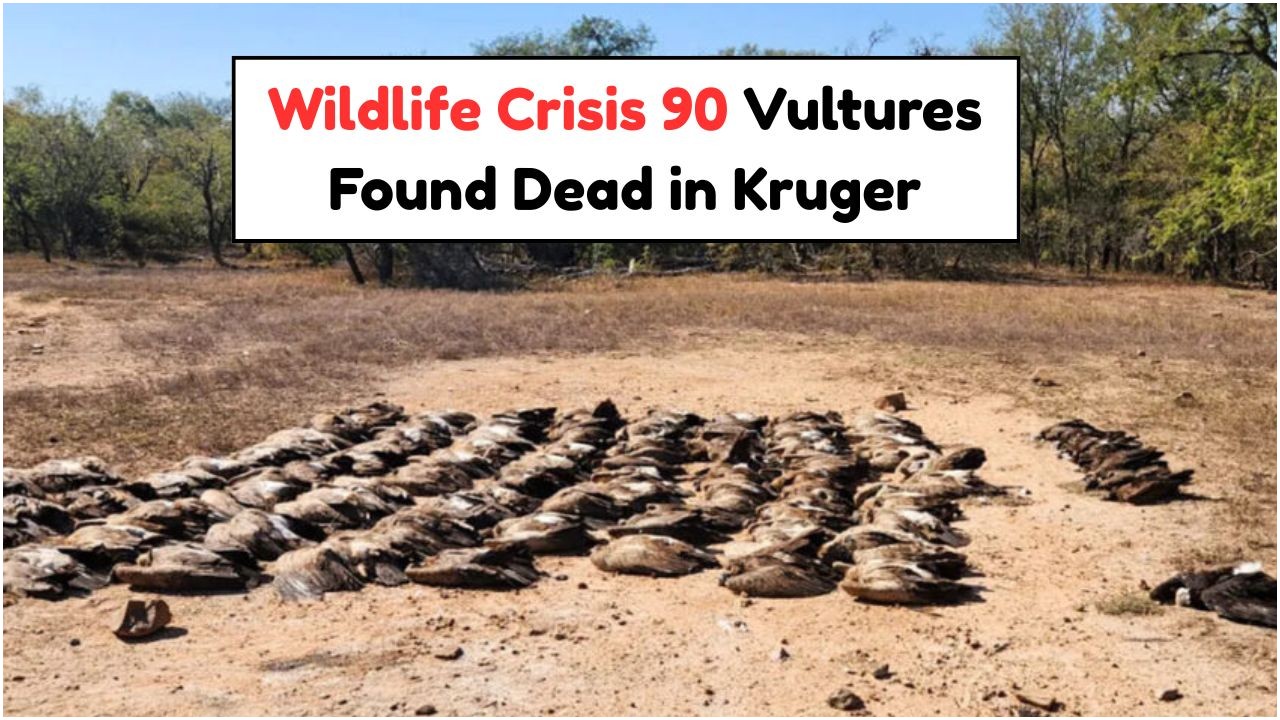Kruger Park Vulture Poisoning Incident: South Africa’s conservation community was shocked when reports emerged of a devastating incident in Kruger National Park. In July, a staggering 90 endangered vultures were found poisoned, leaving wildlife officials and conservationists stunned and scrambling for solutions. This tragic event highlights the critical challenges faced by these majestic birds, often targeted due to their scavenging nature, which can lead them to poisoned carcasses intended for other wildlife.
Impact of Vulture Poisoning on South Africa’s Ecosystem
Vultures play an essential role in maintaining the balance of ecosystems by consuming carrion and preventing the spread of diseases. The recent poisoning in Kruger Park has raised alarms about the potential ecological consequences. With a significant number of these birds perishing, the balance of the park’s ecosystem could be disrupted. Vultures help control diseases such as anthrax, rabies, and botulism by consuming dead animals before these ailments can spread. Their absence could lead to an increase in carcass retention time, which may elevate disease risks for other wildlife and even humans nearby.
- Ecosystem Balance: Vultures help maintain a healthy environment by cleaning up dead animal remains.
- Disease Control: Their scavenging reduces the spread of infectious diseases.
- Biodiversity Impact: The decline of vultures can affect other species dependent on the same ecological niche.
Efforts to Protect Endangered Vultures in Kruger National Park
In response to the tragic poisoning event, various conservation organizations and government agencies have intensified their efforts to protect the remaining vulture populations. Anti-poisoning campaigns are underway, aiming to educate communities about the importance of vultures and the dangers of using poison. Additionally, authorities are enhancing monitoring systems to detect and prevent further incidents, using surveillance technologies and patrols to safeguard these birds.
| Measure | Description | Outcome |
|---|---|---|
| Anti-Poisoning Campaigns | Community education and awareness initiatives | Reduced instances of wildlife poisoning |
| Increased Surveillance | Use of technology and patrols in vulnerable areas | Early detection and prevention of threats |
| Partnerships | Collaboration with local and international NGOs | Enhanced resources and expertise |
Understanding the Causes of Vulture Poisoning in South Africa
The reasons behind vulture poisoning are complex and multifaceted. In many cases, poachers deliberately poison carcasses to kill vultures, preventing them from alerting rangers to illegal activities. Additionally, some locals use poison as a method to kill predators that threaten livestock, inadvertently affecting vultures. Understanding these motivations is crucial for developing effective strategies to mitigate the risks to these endangered birds.
- Poaching Activities: Vultures are often targeted to conceal illegal poaching operations.
- Livestock Protection: Poison is sometimes used to kill predators, impacting vultures unintentionally.
- Lack of Awareness: Communities may not fully understand the ecological role of vultures.
- Illegal Trade: Vultures are sometimes hunted for traditional medicine, further threatening their survival.
Statistics on Vulture Populations in South Africa
| Species | Population Estimate | Conservation Status |
|---|---|---|
| White-Backed Vulture | 4,000 – 5,000 | Critically Endangered |
| Hooded Vulture | 700 – 900 | Critically Endangered |
| White-Headed Vulture | 300 – 400 | Critically Endangered |
| Lappet-Faced Vulture | 800 – 1,000 | Endangered |
Conservation Initiatives to Support Vulture Populations
Several conservation initiatives are underway to support vulture populations in South Africa. These include breeding programs, habitat restoration projects, and international collaborations aimed at strengthening legal frameworks for wildlife protection. Organizations are also working to develop alternative livelihoods for communities relying on wildlife exploitation, reducing the incentive to harm vultures.
- Breeding Programs: Captive breeding to boost population numbers.
- Habitat Restoration: Efforts to restore and protect natural habitats.
- Legal Frameworks: Strengthening laws and enforcement against wildlife crime.
- Community Engagement: Involving local communities in conservation efforts.
The Role of Technology in Vulture Conservation
Technology plays a growing role in conserving vulture populations. GPS tracking devices are used to monitor vulture movements, providing valuable data on their habitats and behaviors. Drones and camera traps are employed to surveil areas and detect potential threats early. These technological advancements are crucial in ensuring the survival of these endangered birds.
| Technology | Usage | Benefits |
|---|---|---|
| GPS Tracking | Monitoring vulture movements | Data collection on habitat and behavior |
| Drones | Area surveillance | Early threat detection |
| Camera Traps | Wildlife monitoring | Identifying and addressing risks |
Community Involvement in Vulture Protection
Community involvement is key to the success of vulture conservation efforts. By engaging local communities, conservationists aim to foster a sense of ownership and responsibility towards protecting these birds. Educational programs and workshops are conducted to raise awareness about the ecological importance of vultures and the threats they face. This community-centric approach is essential for creating sustainable conservation solutions.
- Education Programs: Increasing awareness about vulture conservation.
- Workshops: Training locals in conservation techniques.
- Collaborative Efforts: Partnering with communities for effective conservation.
- Incentive Schemes: Encouraging wildlife-friendly practices.
FAQ Section
Why are vultures important to the ecosystem?
Vultures are vital for ecosystem balance as they consume carrion, preventing the spread of diseases.
What are the main threats to vultures in South Africa?
Key threats include poisoning, habitat loss, and illegal trade for traditional medicine.
How are conservationists protecting vultures in Kruger Park?
Efforts include anti-poisoning campaigns, increased surveillance, and community engagement.
What can individuals do to help vulture conservation?
Individuals can support conservation organizations, spread awareness, and report illegal activities.







